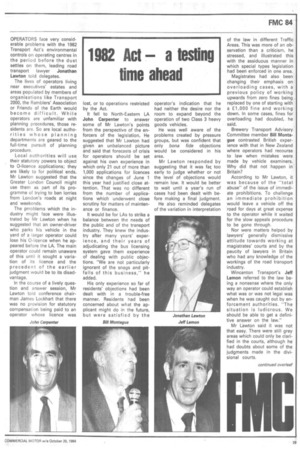1982 Act a testing time ahead
Page 31

If you've noticed an error in this article please click here to report it so we can fix it.
OPERATORS face very considerable problems with the 1982 Transport Act's environmental controls on operating centres in the period before the dust settles on them, leading road transport lawyer Jonathan Lawton told delegates.
The lives of operators living near executives' estates and areas populated by members of organisations like Transport 2000, the Ramblers' Association or Friends of the Earth would become difficult. While operators are unfamiliar with planning procedures, those residents are. So are local authorities whose planning departments are geared to the full-time pursuit of planning procedure.
Local authorities will use their statutory powers to object to 0-licence applications; they are likely to for political ends. Mr Lawton suggested that the Greater London Council might use them as part of its programme of trying to ban lorries from London's roads at night and weekends.
The prroblems which the industry might face were illustrated by Mr Lawton when he suggested that an owner-driver who parks his vehicle in the yard of a larger operator could lose his 0-licence when he appeared before the LA. The main operator could remain unaware of this until it sought a variation of its licence and the precedent of the earlier judgment would be to its disadvantage.
In the course of a lively question and answer session, Mr Lawton told conference chairman James Lockhart that there was no provision for statutory compensation being paid to an operator whose licence was lost, or to operations restricted by the Act.
It fell to North-Eastern LA John Carpenter to answer some of Mr Lawton's points from the perspective of the enforcers of the legislation. He suggested that Mr Lawton had given an unbalanced picture and said that forecasts of crisis for operators should be set against his own experience in which only 21 out of more than 1,000 applications for licences since the changes of June 1 this year had justified close attention. That was no different from the number of applications which underwent close scrutiny for matters of maintenance or finance.
It would be for LAs to strike a balance between the needs of the public and of the transport industry. They knew the industry after many years' experience, and their years of adjudicating the bus licensing system gave them experience of dealing with public objections. "We are not particularly ignorant of the snags and pitfalls of this business," he added.
His only experience so far of residents' objections had been dealt with in a trouble-free manner. Residents had been concerned about what the applicant might do in the future, but were satisfied by the operator's indication that he had neither the desire nor the room to expand beyond the operation of two Class 3 heavy goods vehicles.
He was well aware of the problems created by pressure groups, but was confident that only bona fide objections would be considered in his area.
Mr Lawton responded by suggesting that it was fa( too early to judge whether or not the level of objections would remain low. It would be better to wait until a year's run of cases had been dealt with before making a final judgment.
He also reminded delegates of the variation in interpretation of the law in different Traffic Areas. This was more of an observation than a criticism, he stressed, and illustrated this with the assiduous manner in which special types legislation had been enforced in one area.
Magistrates had also been changing their emphasis on overloading cases, with a previous policy of working upwards from zero fines being . replaced by one of starting with a £1,000 fine and working down. In some cases, fines for overloading had doubled, he said.
Brewery Transport Advisory Committee member Bill Montague contrasted British experience with that in New Zealand where operators had recourse to law when mistakes were made by vehicle examiners. Why did that not happen in Britain?
According to Mr Lawton, it was because of the "total abuse" of the issue of immediate prohibitions. To challenge an immediate prohibition would leave a vehicle off the 'road for days at great expense to the operator while it waited for the slow appeals procedure to be gone through.
Nor were matters helped by lawyers' generally dismissive attitude towards working at magistrates' courts and by the paucity of lawyers in Britain who had any knowledge of the workings of the road transport industry.
Wincanton Transport's Jeff Lemon referred to the law being a nonsense where the only way an operator could establish what was or was not legal was when he was caught out by enforcement authorities. "The situation is ludicrous. We should be able to get a definitive answer on the law."
Mr Lawton said it was not that easy. There were still grey areas which could only be clarified in the courts, although he had doubts about some of the judgments made in the divisional courts.
































































































































































































































